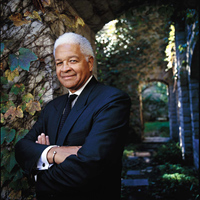| |
 |
| |
© Nathan Mandell
James H. Lowry |
| |
|
Diversity
in action
One
prescription for fixing corporate boards is to make sure the
mix is diverse, that directors include a variety of people
from outside the company, as well as women and minorities.
James
H. Lowry, a vice president with the Chicago office of The
Boston Consulting Group Inc. (BCG), has served on the boards
of several educational institutions and as chairman of the
board of the city of Chicago library system. He also has been
a member of the Kellogg School Dean’s Advisory Board
for the past 15 years.
Lowry
heads BCG’s work force diversity, ethnic marketing and
minority business development consulting practice efforts
and has taught diversity at Kellogg. He says boards would
do well to seek the advice of women, minorities and others
who typically have been underrepresented in their ranks.
“The
question is ‘How can boards accept people who might
give them the best advice in the world, but that’s not
something they would expect?’” he asks.
Just
as corporate directors have responsibilities to diverse constituents,
so do members of the Kellogg Dean’s Advisory Board,
even though the board is an informal group of top professionals
whose non-binding suggestions offer the Kellogg Office of
the Dean another set of insights to use, or not, when making
decisions. But instead of CEOs, shareholders and employees,
advisory board members consider the interests of faculty,
staff, students and alums.
Lowry
began his 15 years of service to Kellogg under Dean Emeritus
Donald P. Jacobs, and says Jacobs’ strong leadership
qualities initially attracted him to the board.
“We
had this very charismatic, energetic visionary who had clear
ideas of where he wanted to take the institution,” Lowry
says. “He didn’t want to settle for being a second-rate
business school.
“He
told us where he wanted to go,” he adds. “The
whole question of branding — that was something he brought
to the board and involved us with.”
Lowry,
who serves on the boards of both the high school and college
he attended, also sees nonprofit board service as a way to
say thanks to those who’ve helped him along the way.
“Part
of the reason I did it — and I’ve done it for
over 30 years — is that there’s a certain amount
of payback,” he says.
— Kari Richardson
|



